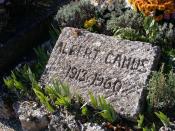Albert Camus was a French-Algerian Nobel Laureate who wrote many essays, articles, novels, and plays on his philosophies of existentialism, the absurd and the morality of man. His most well known works include the novel The Stranger, the essay The Myth of Sisyphus, and the novel The Fall. Through these works he gained much acclaim, as well as much criticism. The childhood and teenage years of Albert Camus' life played an integral role in constructing his writing style and molding his literary opinions.
Albert Camus was born in Mondovi, now called Drean, Algeria in 1913. He is the son of a French father and a Spanish mother. His father was killed in 1914 at the end of World War I. After his father's death, he was raised in poverty by his grandmother and his mother, who was an illiterate charwoman. Frequent bouts with tuberculosis put an end to his studies at the University of Algiers.
It also kept him from doing some of the things he loved like playing soccer and his life in the theater as a playwright, director, and actor. All of these help contribute to the writing style of a Nobel Prize winner.
In 1938, Albert Camus began his career in journalism. He wrote three essays, In The Wrong Side and the Right Side (1937), Nuptials (1938), and Summer (1954). In these essays, Camus explores the themes of poverty, sport, and the horror of human mortality. They explore the beauty of his native Algeria and the joys, sorrows, and intellectual preoccupations of the young Camus.
During World War II, Camus published his first major works on his doctrine of the absurd. The major works were a novel, The Stranger, a book of philosophical essays, The Myth of Sisyphus, and a play, Caligula. He also deals with the...


